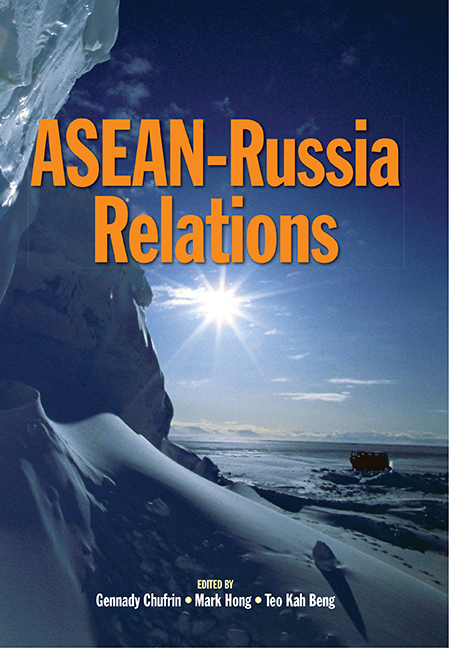Book contents
- Frontmatter
- Contents
- Foreword
- Foreword
- Opening Address
- Opening Address
- The Contributors
- Part I Overview of ASEAN-Russia Relations
- Part II Bilateral Relations
- Part III Security Issues in Southeast Asia
- 5 Terrorism in Southeast Asia
- 6 Southeast Asian Security Challenges: A View from Russia
- 7 Security Issues in Southeast Asia: Commentary
- Part IV Bilateral Economic Relations
- Index
5 - Terrorism in Southeast Asia
from Part III - Security Issues in Southeast Asia
Published online by Cambridge University Press: 09 November 2017
- Frontmatter
- Contents
- Foreword
- Foreword
- Opening Address
- Opening Address
- The Contributors
- Part I Overview of ASEAN-Russia Relations
- Part II Bilateral Relations
- Part III Security Issues in Southeast Asia
- 5 Terrorism in Southeast Asia
- 6 Southeast Asian Security Challenges: A View from Russia
- 7 Security Issues in Southeast Asia: Commentary
- Part IV Bilateral Economic Relations
- Index
Summary
Ms Sidney Jones, Southeast Director of the International Crisis Group and a Visiting Fellow at ISEAS, discussed security threats in the region, notably Jemaah Islamiyah (JI). She noted that terrorism was not viewed as the biggest threat within the region. It was not regime-threatening, although terrorist organizations such as the JI had some capability for violence. The JI was based in Indonesia. Other groups also had broad connections. As the JI weakened, other groups would rise. In the Philippines, there were the MILF, Abu Sayaf and Balek Islam; such groups were mainly used as foot- soldiers. There was no hard evidence of external connections/JI involvement in the terrorism in Southern Thailand. Local issues were usually the prime drivers behind terrorist attacks. But the persecution of Muslims in Chechnya, as well as in Palestine, Iraq and elsewhere, were always cited as grievances in JI documents. In Afghanistan, the recruits from Southeast Asia had trained separately, by themselves. JI leaders had met Khatab in Afghanistan, and Chenchnya was viewed in “romantic terms” by Indonesian mujaheedin, who always had an article about Chechen resistance in their bulletins. There were also video cassettes circulating in Indonesia with titles such as “Hell in Russia”. It was known that three JI members had visited Chechnya. Afghanistan formed the bond between the mujaheedin, and Afghan alumni were the most important core members of “special operations” or suicide bombings. They had carried out the Marriott Hotel attack in Jakarta. From 1984 to 1995, most training had been done in camps in Saada (Pakistan) and Khost and Torkham in Afghanistan, where Indonesians had trained, together with some Filipinos and Tajiks. An academy with a three-year training programme had been set up by the JI in Afghanistan. In 1994, the JI decided to move their training camp to Mindanao. It was in operation from 1996 to 2000. One hundred and seventy-five Indonesians and thirty Malaysians had attended courses there. Small groups went to assist the MILF after 2000.
- Type
- Chapter
- Information
- ASEAN-Russia Relations , pp. 41 - 42Publisher: ISEAS–Yusof Ishak InstitutePrint publication year: 2006



